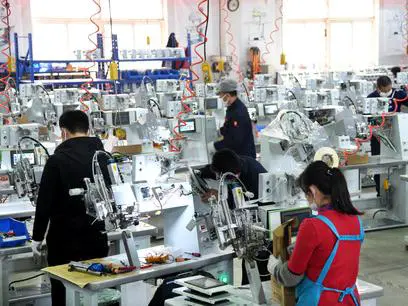In the face of declining overseas orders amid the COVID-19 epidemic, the company Qingdao Benda had planned to give some employees a holiday, but eventually decided to have them all working as usual.
"The pandemic will come to an end sooner or later. We decide to upgrade technology and conduct staff training during this period to prepare for the post-pandemic production," said Liu Yongjiang, vice president of Qingdao Benda.
Established in 1995, Qingdao Benda, a branch of Japan's Benda Kogyo Co., Ltd. in the eastern Chinese city of Qingdao, supplies engine fittings for major global automakers, such as Toyota, Honda, Mitsubishi and Volkswagen.
"We have been developing in China for 25 years and look forward to the further development," Liu said.
The company resumed production on Feb. 10, when 80 percent of its employees returned to their workplaces. A week later, all its 290 employees came back to work.
"The local government provided quarantine places for the employees from other provinces and commuter permits for us, so we can restore production quickly," Liu said.
"We have always had a sound business environment here," Liu emphasized.
With a coronavirus-triggered recession looming large for the world, China has been making efforts to cope with the lingering impact on the economy, including helping workers back to factories, refunding export taxes and deferring payment of social insurance premiums.
"The local bailout policies saved us 1.27 million yuan (about 179,500 U.S. dollars) this year, greatly reducing our losses due to the epidemic," said Wu Jixu, vice president of Weihai Weidongri Comprehensive Foodstuff Co., Ltd., a Japanese enterprise in the eastern Chinese city of Weihai.
"China has done a great job on the prevention and control of COVID-19," Wu said. "We also received help from the local government, such as helping us buy masks during this epidemic."
The outbreak has been effectively controlled in China, and this is a great advantage for enterprises in China, said Song Xuedong, director of the management department of LG Innotek Yantai Co., Ltd. from the Republic of Korea (ROK).
Despite great pressure amid the epidemic, enterprises from Japan and the ROK said they are still confident about their future development in China.
"We won't withdraw investment from China because of the epidemic or any other reasons. We are optimistic about our future development here," said Lee Junjae, vice president of a branch of the ROK's Chang Sung Corporation in Weihai.
"Although our investment in fixed assets hasn't increased this year, the operational investment is still rising, including the purchase of new equipment," Lee added.
Meanwhile, Yoshihide Murayama, general manager of Taiho Kogyo Corporation of Yantai, a Japanese automobile parts maker, said the company will not move out of China in consideration of the transportation costs and industrial chain.
"We have great potential in China, and more products will be exported from here to the world," Murayama said.
With overseas orders keeping falling, foreign enterprises are seeking more business opportunities in China's online and offline markets.
The ROK-invested Qingdao DSR Corp has started to show its products on TikTok, a popular video-sharing app in China.
"More and more people are following us on TikTok. We believe it will become a new marketing channel for us," said Wen Xue, vice president of Qingdao DSR Corp.
 简体中文
简体中文

